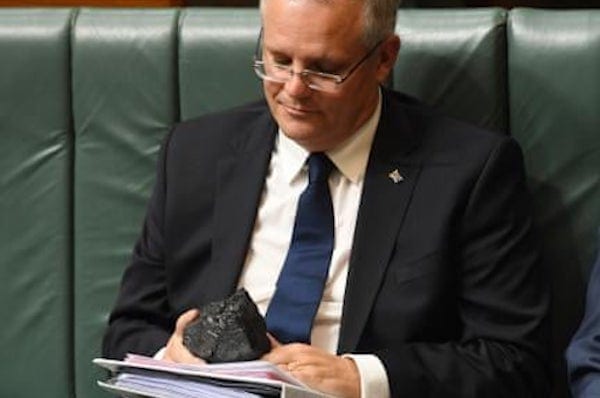His party’s inaction has been called out across the world, as media outlets from the New York Times to the Good Morning Britain are baffled at Australia’s lack of meaningful climate policies and our history of debate on the issue that has eviscerated multiple prime ministers and seen Morrison himself proudly presenting lumps of coal in Parliament.
Now Morrison’s finally feeling the pressure, following a dismal demonstration of his ability to lead during the bushfire crisis that has seen his preferred PM approval ratings plummet in the latest Newspoll, and images of Australians refusing to shake his hand beamed around the world.
And he’s in damage control mode.
He gave a lengthy interview to the ABC Sunday morning and conceded that climate change is leading to “longer, hotter, drier summer seasons”, and that he could have “handled on the ground much better” when visiting fire affected communities.
But just like he faffed about on responding to the bushfire emergency — there was a Religious Freedom Bill to release during a smokey December morning, a family holiday to take, fireworks to watch, an Australian cricket team to greet — so too is he looking to faff about on using the current crisis to meaningfully address Australia’s position on climate change.
One happy customer 🦘🥕🥕🥕🥕#operationrockwallaby #AustralianFires pic.twitter.com/wtzMgeaX6D
— Matt Kean MP (@Matt_KeanMP) January 11, 2020
Here’s the new plan, as told to the ABC.
“In the years ahead we are going to continue to evolve our policy in this area to reduce emissions even further and we’re going to do without a carbon tax, without putting up electricity prices and without shutting down traditional industries upon which regional Australians depend for their very livelihood.”
Not weeks ahead, not even months ahead, but years ahead.
He’s continuing to declare Australia will “meet and beat” our Paris emissions reductions targets (Australia is controversially relying on a loophole in the system of ‘carryover credits’) but has not committed to a stronger near-term target.
He wants a “balanced policy” that “recognises Australia’s broader national economic interests and social interests” and sees the country get “better and better and better” at reducing emissions.
He doesn’t want anything to damage those “traditional industries”.
And just to be sure that he’s seen to be responding to the crisis now, Morrison also suggested a Royal Commission could be called into the bushfire crisis, one that considers climate change and how to respond to more catastrophic fire events in the future.
Such an inquiry could be years in the making, would be a boon for lawyers and may lead to some actionable items on responding to similar emergencies in the future, but it’s no answer to the lack of climate inaction that we are actively demonstrating to the world right now, even as huge portions of our country are burning.
Faffing about may just be Morrison’s strategy for getting through the years of his prime ministership without having to upset the climate denialists within his own party, or get on the wrong side of the Murdoch media.
But Australia has faffed on climate change long enough.
To all those who argued that the ‘costs’ of reducing emissions were too high, I cant wait to hear your views on the costs of feeding wallabies by helicopter. Prevention is cheaper than cure. It’s not complicated #AustralianFires #auspol https://t.co/u07poTSE7V
— Richard Denniss (@RDNS_TAI) January 12, 2020
Awaiting “years ahead” for a policy evolution on the matter is hardly reassuring given the length and severity of our bushfire seasons have already evolved, as had long been predicted would occur, and was outlined clearly in the 2008 Garnaut Climate Change Review, commissioned by the Rudd Government. John Howard announced an emissions trading scheme way back in June 2007 — and we can see how that and other related policies have evolved over the past decade.
Australia has an opportunity to use this crisis to demonstrate global leadership and play a significant part in the push for lower global emissions.
This could be Morrison’s moment to achieve a global legacy that lasts well beyond anything he could achieve by attempting to hold onto his job by faffing about in order to appease the shock-jocks and keep his backbenchers quiet.


